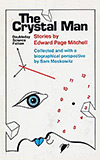Edward Page Mitchell
| Full Name: | Edward Page Mitchell |
| Born: | March 24, 1852 Bath, Maine, USA |
| Died: | January 22, 1927 New London, Connecticut, USA |
| Occupation: | Writer, Editor, Journalist |
| Nationality: | American |
| Links: |
|
Biography
Edward Page Mitchell was an American editorial and short story writer for The Sun, a daily newspaper in New York City. He became that newspaper's editor in 1897, succeeding Charles Anderson Dana. Mitchell was recognized as a major figure in the early development of the science fiction genre. Mitchell wrote fiction about a man rendered invisible by scientific means ("The Crystal Man", published in 1881) before H. G. Wells's The Invisible Man, wrote about a time-travel machine ("The Clock that Went Backward") before Wells's The Time Machine, wrote about faster-than-light travel ("The Tachypomp"; now perhaps his best-known work) in 1874, a thinking computer and a cyborg in 1879 ("The Ablest Man in the World"), and also wrote the earliest known stories about matter transmission or teleportation ("The Man without a Body", 1877) and a superior mutant ("Old Squids and Little Speller"). "Exchanging Their Souls" (1877) is one of the earliest fictional accounts of mind transfer. Mitchell retired in 1926, a year before dying of a cerebral hemorrhage.
Mitchell was born in Bath, Maine, the home of his maternal grandparents. Mitchell's family were wealthy at the time of his birth. When he was eight years old, his parents moved with him to New York City, to a house on Fifth Avenue directly across from the future site of the New York Public Library's main branch.
In 1863 he witnessed the Draft Riots, later describing them in his memoirs. In the aftermath of the bloody riots, Mitchell's father moved the family to Tar River, North Carolina. While living there, as a boy of fourteen, young Mitchell's letters to The Bath Times (his birthplace's local paper) were his first published writing.
Works in the WWEnd Database
Non Series Works |
|||||||||||||||||||
|
|
|
|
|
|||||||||||||||



















 Full Details
Full Details








